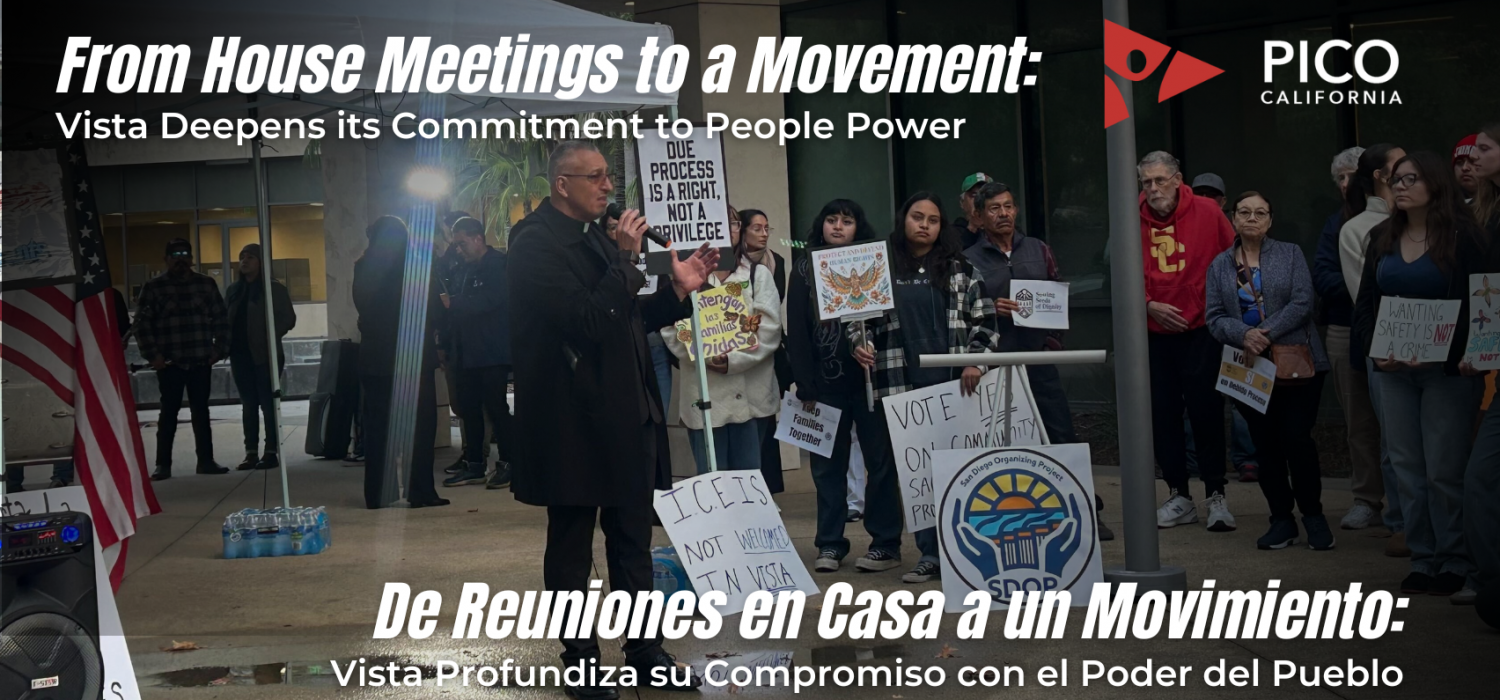Part II: How a Church, a City and a Network Doubles their Power when it Mattered Most
En Español abajo
In Vista, hundreds of immigrant families, parishioners and neighbors showed up twice in two months to defend a simple but powerful principle: every resident deserves constitutional protections, no matter their immigration status. The due-process resolution, introduced by Councilmember Corinna, to prevent unconstitutional enforcement actions, protect residents from warrantless detentions and require basic safeguards for immigrant families, became the moral center of a grassroots movement led by the San Diego Organizing Project (SDOP) and St. Francis of Assisi Catholic Church.
The September vote proved the community was ready to speak. The November 18 vote proved the community was ready to organize, returning in even greater numbers, stronger relationships and deeper courage. What began as a quiet house meetings gre into a turnout of nearly 600 people, filling City Hall, overflow rooms, hallways and courtyards with a unified call for dignity and rights.
A Second Vote, a Stronger Community
To understand how Vista doubled its turnout and deepened its courage, PICO California spoke with Lourdes Farhat, a parish leader at St. Francis and with the San Diego Organizing Project, whose story reflects the heart of this movement.
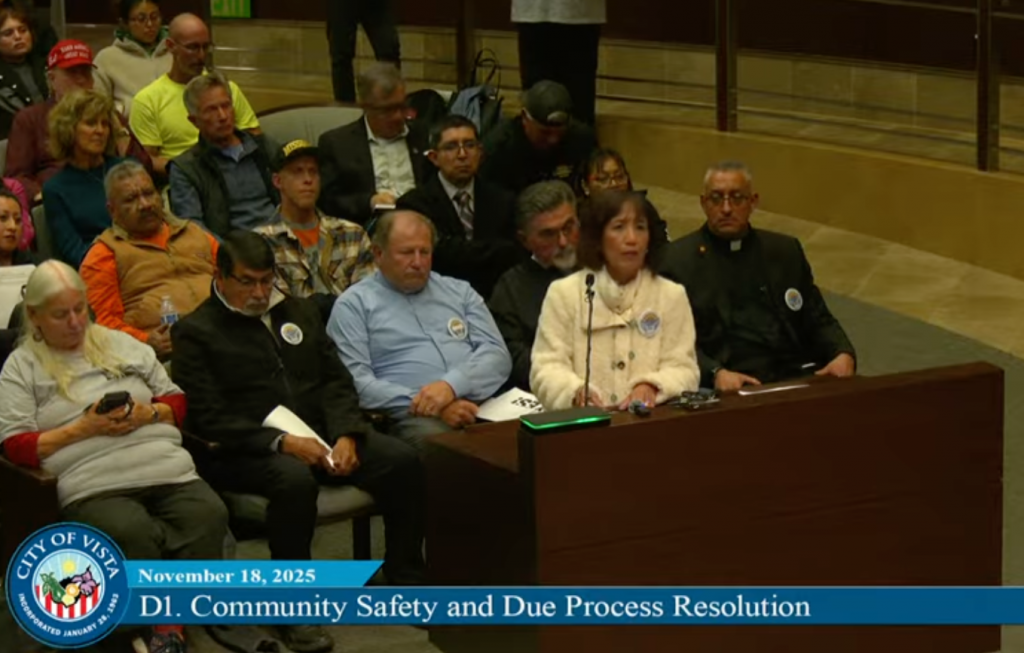
For Lourdes, the contrast between the two nights could not have been clearer:
“The first vote had so much pressure and fear.” “For the second one, we were more organized. Everything flowed. We knew where to place people, who would bring sighs, who would answer questions.” – Lourdes
In September, the opposition dominated the room. In November, the community that had been meeting in living rooms and church classrooms came prepared and they stayed.
“There were fewer opponents this time and they left early. Our people stayed until the end.” – Lourdes
It was not just turnout. It was coordination, the kind that only emerges from deep relational work.
House Meetings as the Engine of Power
Part II of the Vista story reveals the true power of house meetings: not just activating people once, but forming a network that grows leader by leader.
Lourdes herself became inspired after attending a house meeting hosted by another parish member:
“I attended a house meeting in September and it inspired me to host one of my own.” “This is my calling, giving back to the community I served for 42 years as a nurse.” – Lourdes
These meetings didn’t just surface fear. They transformed it into a shared purpose. Organizings brought the actual resolution text to families so they could see through the misinformation.
“People were hearing lies on TikTok and social media. When we brought them the real resolution language, everything changed. They saw the truth for themselves. – Lourdes
Through dozens of conversations, the web or relationships stretched wider, stronger enough to hold hundreds at City Hall.
A Pastor Whose Leadership Became a Pillar of the Movement
Many faith leaders were present throughout Vista’s organizing effort, offering prayers, testimony and support. But Pastor Rubén Arceo of St. Francis stands out as an essential pillar, with consistent presence, clarity and moral courage deeply shaped the community’s turnout.
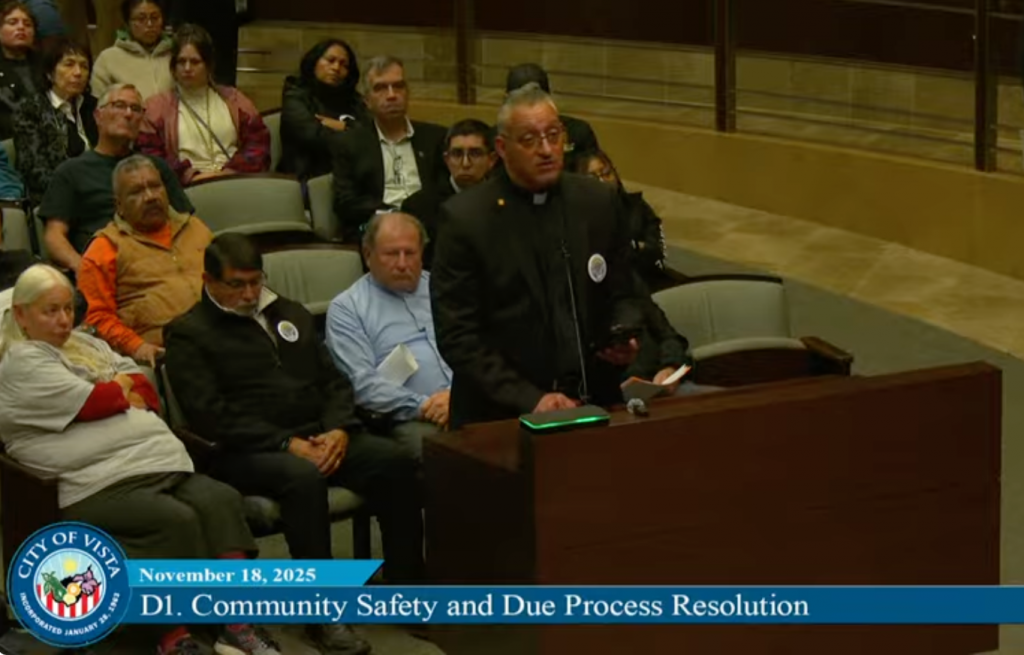
On the night of the final vote, Pastor Rubén reminded the council of the scale, and the human reality, of the parish he serves:
“My parish has 13,000 people coming to worship every Sunday, 9,000 families, 90 percent immigrants. Our people are suffering and I come here to voice them.” – Pastor Ruben
His message was grounded in both faith and civic responsibility: “We believe in the dignity of every human being. Due process is a right we all have.” – Pastor Rubén
Behind the scenes, he was a steady source of support, allowing announcements at every mass, opening the doors to house meetings and ministry-based outreach, encouraging youth participation, and hosting a prayer vigil at the parish for those too afraid to enter City Hall. Lourdes emphasized how pivotal his support was in mobilizing hundreds:
“We’re blessed to have a pastor who supports us. Not every parish has that.” – Lourdes
Through his presence, Pastor Ruben helped transform fear into collective courage.
When Misinformation Meets Organized Truth
As the final vote approached, Vista faced an influx of misinformation. Councilmember Katie Melendez confronted it directly, calling out the mayor’s claims, his TV appearances, his repeated references to “criminals,” and his insinuations that supporters were being “bussed in.”
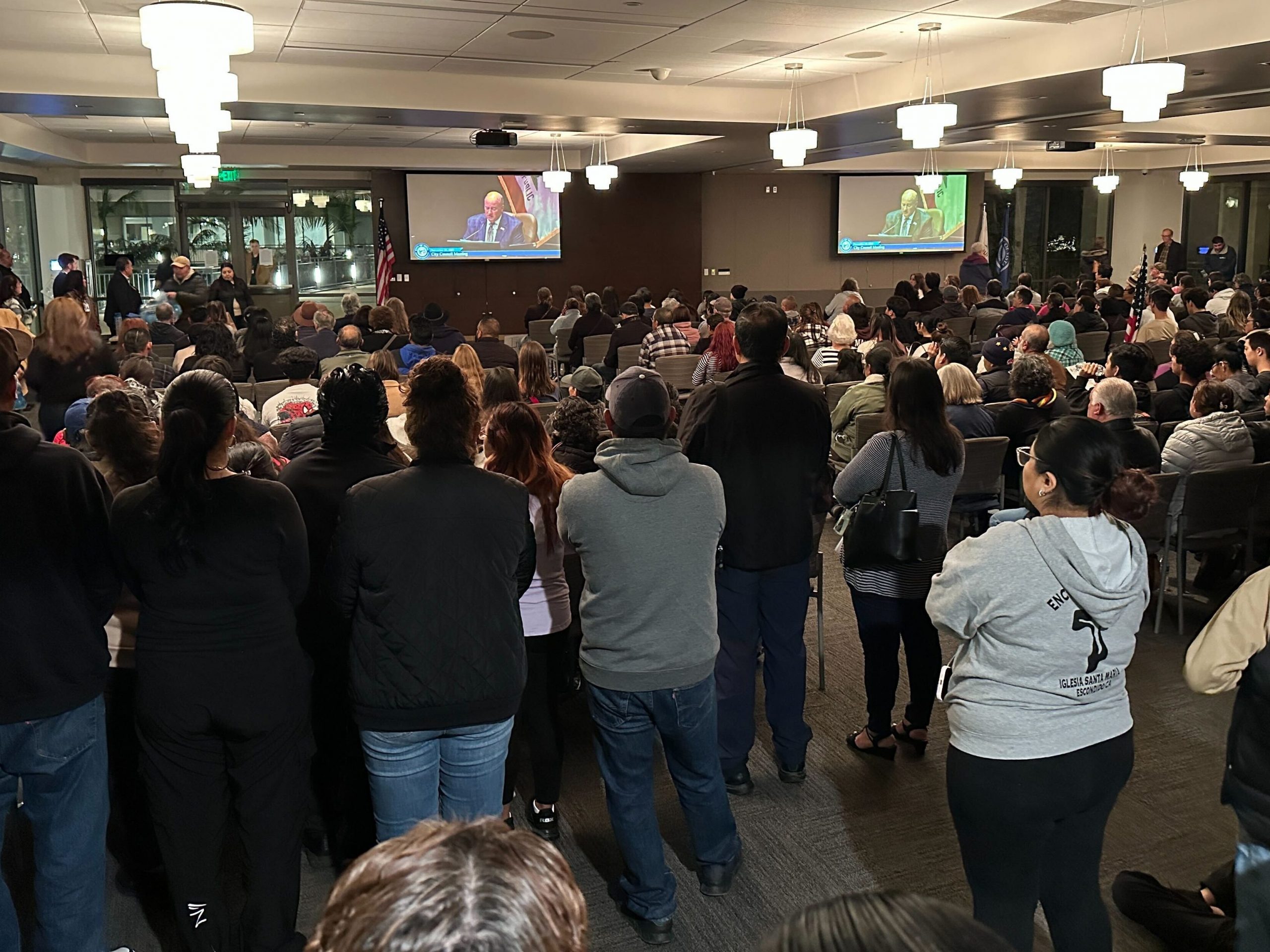
“These are Vista families. These are our neighbors. People are not being bussed in, our community is showing up because they care.” “Immigrants do not make our city more dangerous. This type of resolution maintains order. We will look around and help each other, because our people are resilient and show up for each other.” – Councilmember Katie Melendez
Her courage helped many first-time attendees feel welcome in a Space they had once believed was not for them.
Turning Out a City and Stepping into What Comes Next
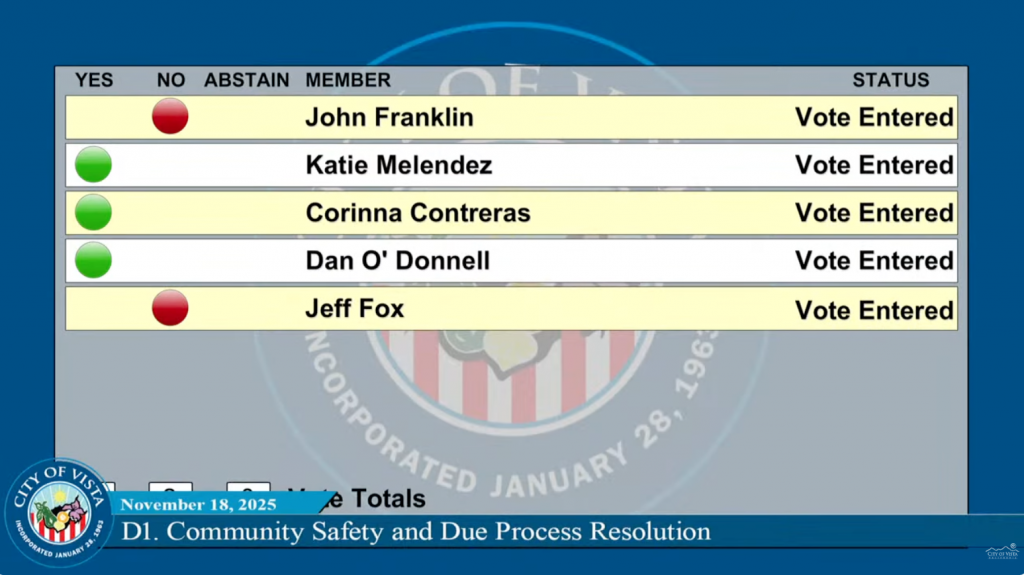
By November 18, Vista’s immigrant community walked into City Hall with a different spirit, confident, organized and ready to stay.
“Win or lose, we were together. But when the vote passed, jubilee, hugging, unity.” – Lourdes
Even when the media left before the vote the community remained.
“People outside were chanting and clapping. The opposition left early. We stayed.” – Lourdes
Now the focus shifts to implementation: Know Your Rights education, public signage and ensuring the city follows through. For Lourdes, her work remains rooted in connection:
“Education is everything. Keeping people informed, this is what organizing is for me.”
The Lesson of Vista, Part II
Vista’s final vote shows what becomes possible when faith, relationships and organizing work in tandem. House meetings created leaders. Leaders built a turnout. Turnout cultivated a community that refuses to be invisible.
In Vista, people didn’t just win a vote. They demonstrated a truth that will guide the city for years to come.
Courage, once organized, always returns stronger.
En Español
De Reuniones en Casa a un Movimiento: Vista Profundiza su Compromiso con el Poder del Pueblo
Parte II: Cómo una iglesia, una ciudad y una red duplicaron su fuerza cuando más importaba
En Vista, cientos de familias inmigrantes, feligreses y vecinos se presentaron dos veces en dos meses para defender un principio simple pero poderoso: cada residente merece protecciones constitucionales, sin importar su estatus migratorio. La resolución de debido proceso —presentada por la concejal Corinna, buscaba prevenir acciones de cumplimiento inconstitucionales, proteger a los residentes de detenciones sin orden judicial y exigir salvaguardas básicas para las familias inmigrantes. Con el liderazgo del San Diego Organizing Project (SDOP) y de la Parroquia San Francisco de Asís, esa resolución se convirtió en el centro moral de un movimiento comunitario.
La votación de septiembre demostró que la comunidad estaba lista para alzar la voz. La votación del 18 de noviembre demostró que la comunidad estaba lista para organizarse. Regresaron con aún más fuerza, con relaciones más profundas y con un coraje más firme. Lo que comenzó como reuniones silenciosas en casas terminó convirtiéndose en una participación de casi 600 personas que llenaron el Ayuntamiento, las salas adicionales, los pasillos y los patios con un llamado unificado por la dignidad y los derechos.
Una Segunda Votación, una Comunidad Más Fuerte
Para entender cómo Vista duplicó su participación y profundizó su valentía, PICO California habló con Lourdes Farhat, líder parroquial en San Francisco de Asís y miembro del San Diego Organizing Project, cuya historia refleja el corazón de este movimiento.
Para Lourdes, el contraste entre ambas noches fue contundente:
“La primera votación tuvo muchísima presión y miedo.” “Para la segunda, estábamos más organizados. Todo fluyó. Sabíamos dónde ubicar a la gente, quién traería los carteles, quién respondería preguntas.” – Lourdes
En septiembre, la oposición dominó la sala. En noviembre, la comunidad que había estado reuniéndose en salas de estar y salones parroquiales llegó preparada y se quedó.
“Hubo menos opositores esta vez y se fueron temprano. Nuestra gente se quedó hasta el final.” – Lourdes
No fue solo la participación. Fue la coordinación, el tipo de coordinación que solo nace del trabajo relacional profundo.
Las Reuniones en Casa: El Motor del Poder
La Parte II de la historia de Vista muestra el verdadero poder de las reuniones en casa: no solo activar a las personas una vez, sino formar una red que crece líder por líder.
Lourdes misma se inspiró después de asistir a una reunión en casa organizada por otra feligresa:
“Asistí a una reunión en septiembre y me inspiró a organizar una propia.”
“Este es mi llamado, devolver a la comunidad a la que serví por 42 años como enfermera.” – Lourdes
Estas reuniones no solo sacaron a la luz el miedo. Lo transformaron en propósito compartido. Las organizadoras llevaron el texto real de la resolución a las familias para que pudieran ver más allá de la desinformación.
“La gente escuchaba mentiras en TikTok y redes sociales. Cuando les llevamos el lenguaje real de la resolución, todo cambió. Vieron la verdad con sus propios ojos.” – Lourdes
A través de decenas de conversaciones, la red de relaciones se extendió, lo suficientemente fuerte como para sostener a cientos de personas en el Ayuntamiento.
Un Pastor Cuya Presencia se Convirtió en un Pilar del Movimiento
Muchos líderes de fe estuvieron presentes durante la campaña en Vista, ofreciendo oraciones, testimonios y apoyo. Pero el Padre Rubén Arceo, de San Francisco de Asís, destacó como un pilar esencial. Su presencia constante, su claridad y su valor moral moldearon profundamente la participación comunitaria.
La noche de la votación final, el Padre Rubén recordó al concejo la magnitud —y la realidad humana— de la comunidad a la que sirve:
“Mi parroquia tiene 13,000 personas que vienen a misa cada domingo, 9,000 familias, 90 por ciento inmigrantes. Nuestra gente está sufriendo y yo vengo a darles voz.” – Padre Rubén
Su mensaje se basó tanto en la fe como en la responsabilidad cívica:
“Creemos en la dignidad de todo ser humano. El debido proceso es un derecho que todos tenemos.” – Padre Rubén
Detrás de escena, su apoyo fue constante: permitió anuncios en todas las misas, abrió espacios para reuniones en casa, impulsó el alcance ministerial, alentó la participación juvenil y organizó una vigilia de oración para quienes tenían demasiado miedo de entrar al Ayuntamiento. Lourdes subrayó cuánto pesó su liderazgo en la movilización de cientos:
“Somos bendecidos por tener un párroco que nos apoya. No todas las parroquias tienen eso.” – Lourdes
Con su presencia, el Padre Rubén ayudó a transformar el miedo en coraje colectivo.
Cuando la Desinformación se Encuentra con una Comunidad Organizada
Mientras se acercaba la votación final, Vista enfrentó una ola de desinformación. La concejal Katie Meléndez la confrontó directamente, denunciando las afirmaciones del alcalde, sus apariciones en televisión, sus referencias a “criminales” y su insinuación de que los asistentes estaban siendo “transportados en autobús.”
“Estas son familias de Vista. Son nuestros vecinos. La gente no está siendo transportada; nuestra comunidad está presentándose porque le importa.”
“Los inmigrantes no hacen nuestra ciudad más peligrosa. Este tipo de resolución mantiene el orden. Nos cuidamos mutuamente porque nuestra gente es resiliente y siempre se presenta por los demás.” – Concejal Katie Meléndez
Su valentía ayudó a que muchas personas que asistían por primera vez se sintieran bienvenidas en un espacio que antes creían que no era para ellas.
Movilizar a Una Ciudad y Dar el Siguiente Paso
Para el 18 de noviembre, la comunidad inmigrante de Vista entró al Ayuntamiento con un espíritu diferente: confiada, organizada y lista para quedarse.
“Ganáramos o perdiéramos, estábamos juntos. Pero cuando la resolución pasó, hubo júbilo, abrazos, unidad.” – Lourdes
Incluso cuando los medios se fueron antes del voto, la comunidad permaneció.
“La gente afuera seguía cantando y aplaudiendo. La oposición se fue temprano. Nosotros nos quedamos.” – Lourdes
Ahora el enfoque pasa a la implementación: educación sobre derechos, señalización pública y asegurarse de que la ciudad cumpla con lo aprobado. Para Lourdes, su trabajo sigue enraizado en la conexión:
“La educación lo es todo. Mantener a la gente informada, eso es organizar para mí.”
La Lección de Vista, Parte II
La votación final en Vista muestra lo que es posible cuando la fe, las relaciones y la organización trabajan juntas. Las reuniones en casa formaron líderes. Los líderes construyeron una participación masiva. Y esa participación cultivó una comunidad que se niega a ser invisible.
En Vista, la gente no solo ganó una votación. Demostró una verdad que guiará a la ciudad por años:
